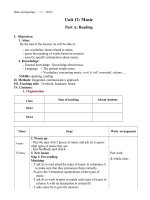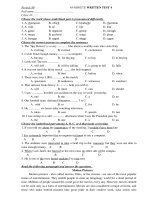GIÁO ÁN TIẾNG ANH LỚP 10 bam sat 10 II 10 (defining vs non defining relative clause)
Bạn đang xem bản rút gọn của tài liệu. Xem và tải ngay bản đầy đủ của tài liệu tại đây (77.59 KB, 3 trang )
Self-chosen - English 10
Week:11 (the second term)
Period:29
DEFINING vs NON-DEFINING RELATIVE CLAUSES
I. AIM :
Students are able to
- Review the use of defining and non-defining relative clauses.
- Distinguish the use of defining and non-defining relative clauses.
II. LANGAUGE CONTENT :
1. Grammar : defining and non-defining relative clauses
2. Vocabulary : Words appear in the exercise.
III. PROCEDURE :
Teacher’s and Students’ activities
- T. shows a sub-board to provide Ss.
with a small exercise.
- Ss. discuss the answers with their
partners.
- T. calls on some Ss. to read aloud
the words in each sentence and give
their answers.
- T. checks with the whole class.
- T. raises the definition of a defining
and a non-defining relative clause.
- T. notices Ss. the different form of
non-defining relative clauses vs.
defining relative clauses.
- Then, T. introduces some cases that
we use non-defining relative clauses.
- T. gives examples to illustrate for
each case.
- Ss. look at the board and takes notes
into their notebooks.
Content
I. WARM UP : ( 5 mns)
Sub-board: Choose the best answers
A. Pronunciation
1. A. famous B. flourish
C. honour
D. behaviour
2. A. citadel
B. brilliant
C. architecture D. site
3. A. dynasty B. dragon
C. statue
D. banyan
B. Stress
4. A. cathedral
B. museum
C. historical
D. preserve
5. A. establish
B. educate
C. engrave
D. contain
Answers: 1- B
2- D
3- C
4- D
5- B
II. LANGUAGE CONTENT :
1. Presentation: ( 15 mns)
¯ DEFINING RELATIVE CLAUSES: are clauses that give essential
information to define or identify the person or thing we are talking
about.
² Form: No commas are used in defining relative clauses.
E.g: The woman who spoke at the meeting was my sister.
¯ NON-DEFINING REALTIVE CLAUSES: are clauses that tell us
more information about someone or something. The information in
these clauses are not essential.
² Form: Non-defining relative clauses are always separated from
the rest of the sentence by commas.
E.g: Peter, who is a lawyer, talk persuasively.
² Notes: In non-defining relative clauses, we cannot use “that”
instead of “who, whom, and which”.
² We use non-defining relative clauses when the noun or phrase
before it is:
a) a proper noun : Here is Le Hong Phong high school, which is
Teacher : Nguyeãn Thò Thu Thuûy
Self-chosen - English 10
- T. provides the exercise on a small
board and explains the requirement.
- Ss. work individually and then
compare their answers with a partner.
- After that, T. asks Ss. to give their
answers and explains their choices.
- Ss. give out the answers in front of
the class.
- T. checks with the whole class.
- T. shows the exercise on a small
board and explains the requirement
and new words if any.
- Ss. copy into their notebooks.
one of the best in Vietnam.
b) something unique : Mars, which is very hot, is being
explored.
c) modified by a demonstrative pronoun (this, that, these, those) :
We all like that little boy, who is my next-door neighbour’s son.
d) modified by a possessive adjective (your, his, her, my. their,
our…) : My pen, which looks like yours, has been stolen.
2. Practice : (25 mns)
Exercise 1: Fill each blank with a suitable relative pronoun, put a
comma where necessary.
1. I can’t find the book………………..you lent me last week.
2. He wrote a book ……………………………the critics disliked.
3. The management didn’t consider my application ………………I thought
was rather unfair.
4. Kevin Slob……………used to be a plumber is now a movie star.
5. Nam’s parents…………….are both retired now live in Binh Duong.
6. Lam…………….I’ve known for years is a very nice person.
7. The chair ………………….was broken has now been repaired.
8. Those people……………..live next door helped us move the furniture.
9. His second film………………..was released last week is called Big
Frank.
10. I met Loan last night with a friend ………………….is studying at Tran
Dai Nghia high school.
Answers :
1. which (no commas)
2. which (no commas)
3. which (………application, which……..)
4. who (Kevin Slob, who …………., is…………..)
5. who (Nam’s parents, who……………, now…………….)
6. whom (Lam, whom……………, is ………………)
7. which (no commas)
8. who (Those people, who …………., helped……….)
9. which (……film, which…………., is………….)
10. who (no commas)
Exercise 2: Combine the pairs of sentences, using a correct relative
pronoun.
1. My uncle Tom is coming to visit me. He lives in Manchester.
2. The people are very enthusiastic. They volunteer to do charity
work.
3. Peter’s sister is a nice person. I’ve known her for ages
4. I’ll introduces you to a man. His support is necessary for your
project.
5. Do you know that tall man? Our principle is talking to him.
Teacher : Nguyeãn Thò Thu Thuûy
Self-chosen - English 10
- Ss. work individually, then compare
their answers with a partner.
- T. goes around the class to offer
help.
- T. calls on some Ss. to give their
answers on the board.
- Ss. go to the board and write down
their sentences.
- T. has other Ss. give comments and
corrective feedback.
- Then, T. gives final comments.
6. The bed is very comfortable. We sleep in it.
7. Our teacher assigned us the homework. We had to finish it
within a week.
8. I’m going to be interviewed for my new job. That makes me
nervous.
9. This is my close friend. I talked to you about him last night.
10. We listened to her talk last night. It was really interesting.
Answers:
1. My uncle Tom, who lives in Manchester, is coming to visit me.
2. The people who volunteer to do charity work are very
enthusiastic.
3. Peter’s sister, whom I’ve known for ages, is a nice person.
4. I’ll introduces you to a man whose support is necessary for you
project.
5. Do you know that tall man, whom our principle is talking to?
6. The bed which we sleep in is very comfortable.
7. Our teacher assigned us the homework which we had to finish
within a week.
8. I’m going to be interviewed for my new job, which makes me
nervous.
9. This is my close friend, whom I talked to you about last night.
10. We listened to her talk last night, which was really interesting.
III. HOMEWORK : (1 mn)
-Ss. review the use of defining and non-defining relative clause and
make 5 sentences, using them.
¯Self-evaluation
………………………………………………………………………………………………………………………………………………………………………………….................
………………………………………………………………………………………………………………………………………………………………………………………………………
………………………………………………………………………………………………………………………………………………………………………………………………………
Teacher : Nguyeãn Thò Thu Thuûy









